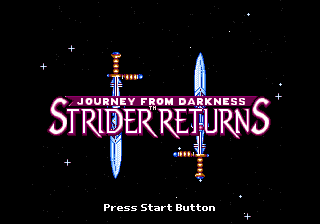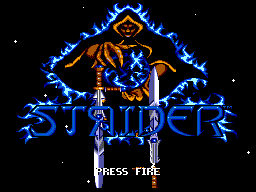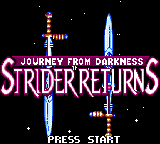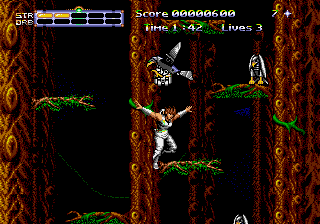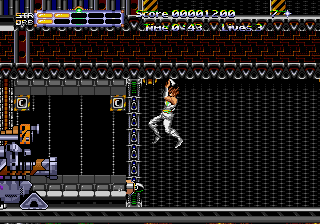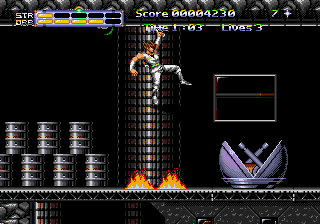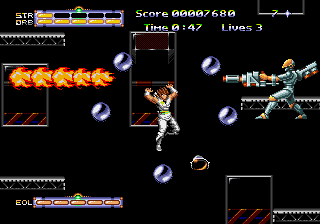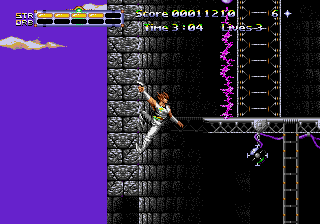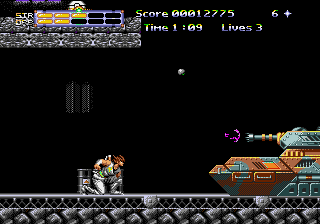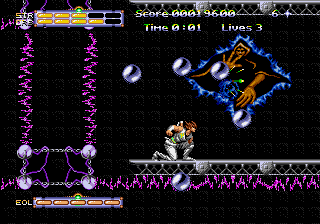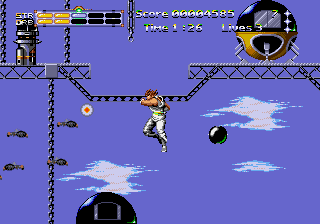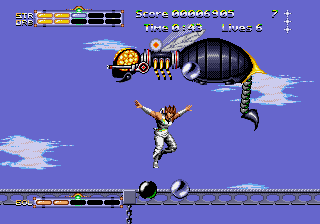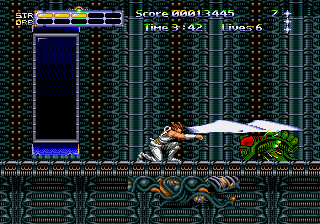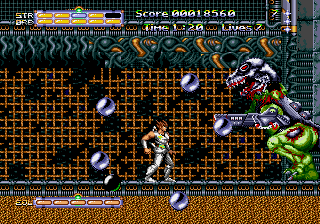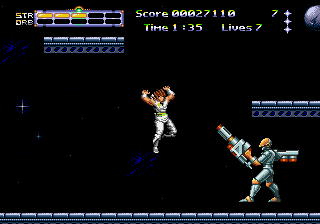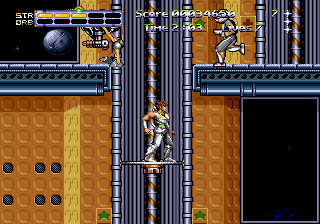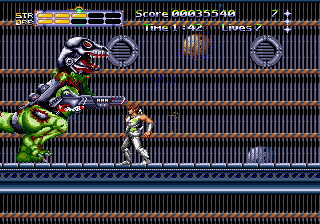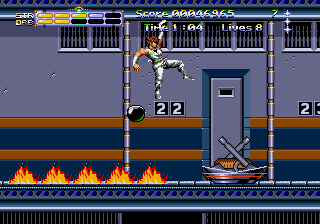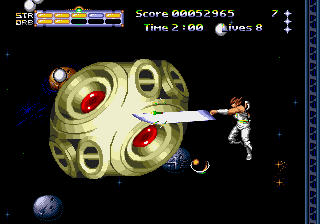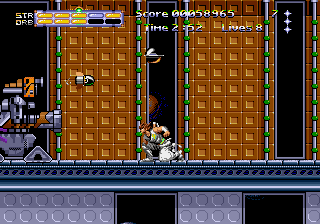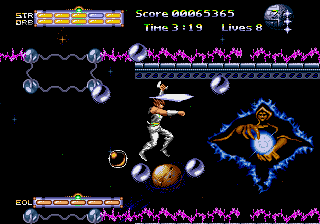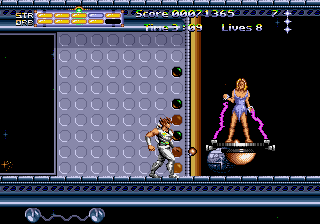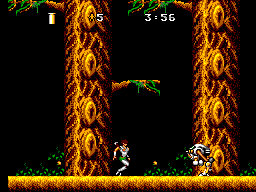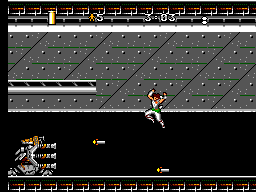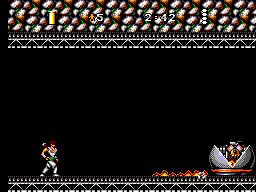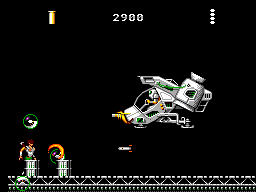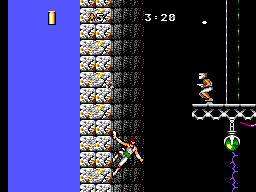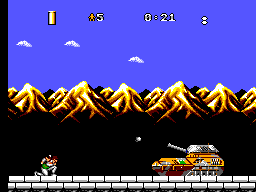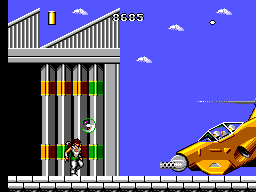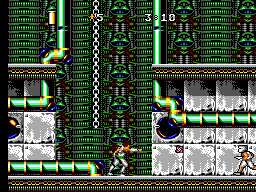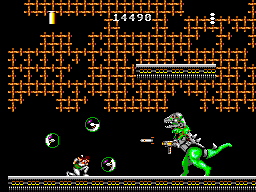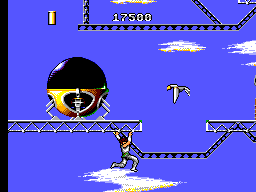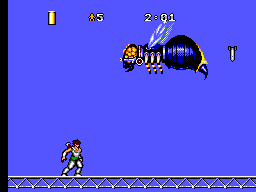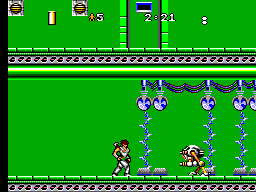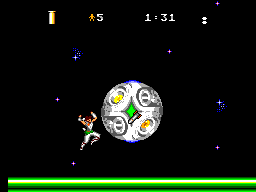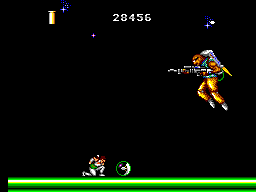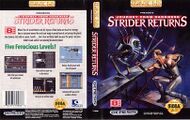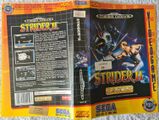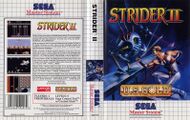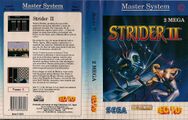Strider II
From Sega Retro
| Strider II | ||||||||||||||||||||||||||||||||||||||||||||||||||||||||||||||||||||||||||||||||||||||||||
|---|---|---|---|---|---|---|---|---|---|---|---|---|---|---|---|---|---|---|---|---|---|---|---|---|---|---|---|---|---|---|---|---|---|---|---|---|---|---|---|---|---|---|---|---|---|---|---|---|---|---|---|---|---|---|---|---|---|---|---|---|---|---|---|---|---|---|---|---|---|---|---|---|---|---|---|---|---|---|---|---|---|---|---|---|---|---|---|---|---|---|
| System(s): Sega Mega Drive, Sega Master System, Sega Game Gear | ||||||||||||||||||||||||||||||||||||||||||||||||||||||||||||||||||||||||||||||||||||||||||
| Publisher: U.S. Gold | ||||||||||||||||||||||||||||||||||||||||||||||||||||||||||||||||||||||||||||||||||||||||||
| Developer: Tiertex | ||||||||||||||||||||||||||||||||||||||||||||||||||||||||||||||||||||||||||||||||||||||||||
| Distributor: Hent Gruppen (SE rental) Tec Toy (BR) | ||||||||||||||||||||||||||||||||||||||||||||||||||||||||||||||||||||||||||||||||||||||||||
| Licensor: Capcom USA | ||||||||||||||||||||||||||||||||||||||||||||||||||||||||||||||||||||||||||||||||||||||||||
| Genre: Action[1] | ||||||||||||||||||||||||||||||||||||||||||||||||||||||||||||||||||||||||||||||||||||||||||
| Number of players: 1 | ||||||||||||||||||||||||||||||||||||||||||||||||||||||||||||||||||||||||||||||||||||||||||
| ||||||||||||||||||||||||||||||||||||||||||||||||||||||||||||||||||||||||||||||||||||||||||
|
Strider II is a sequel to Strider, released for the Sega Mega Drive, Sega Master System, and the Sega Game Gear in 1993. It is known as Journey from Darkness: Strider Returns in North America (although initially it too was known as Strider II), which is also the title of the Game Gear version in all regions. Strider II was developed by Tiertex, who ported the original game to the Master System and various home computers, and published by U.S. Gold, who had the rights to the Strider license outside of Japan at the time.
It should not be confused with the later release of Strider 2, which was developed in-house by Capcom.
Contents
Story
| “ |
This guy is like a bad habit, he just won't go away. Now this Evil Master Dude and his legions of nimrods are poised above the planet in a space station, ready to make the planet one big black hole. Not only that, those blasted automadions (space slang for funky robot type guys) have captured Lexia (Not the car, the babe!) and holding her prisoner aboard their space station. Don't it just make your blood boil? Doesn't it make your skin crawl? Does it make your face turn red with anger? Hold on, get a grip! We've been in this kind of fix before. Okay, okay, you're right, probably not this bad. But hey, this is a video game there's always a good guy somewhere. Get with the program! It just so happens, that on the island Moralos (you remember the secret base of famous Striders) there is just the guy you are looking for. The most pumped up Strider of them all Hinjo, is just waiting to punch these guys' light out. Go ahead, grab that control pad and give it a shot, sounds like a piece of cake... Wrong! This baby's not your every day space walk in the park! Strider's back and the fun is about to begin. Rumble on Strider Dude! |
„ |
— US manual [12] | ||
Grandmaster Meio, the antagonist of the first game, has captured the princess, Lexia (who is not a car). The Strider known as Hinjo must rescue her.
Gameplay
Mega Drive version
The game is an action platformer and plays similarly to its forebear. The Strider Hinjo starts each stage in a capsule and must make his way through the stage to the capsule at the end. Hinjo collects orbs throughout each stage, and these orbs surround Hinjo and protect him when he faces the stage's boss.
Hinjo moves with ![]() and
and ![]() and crouches with
and crouches with ![]() . He does a vertical jump with
. He does a vertical jump with ![]() and a cartwheel jump with
and a cartwheel jump with ![]() +
+![]() or
or ![]() +
+![]() . He slides along the ground with
. He slides along the ground with ![]() +
+![]() . Hinjo has a hook that he uses to latch onto platforms, ceilings, and walls, which he can then climb across. While hanging, he can jump off a ceiling with
. Hinjo has a hook that he uses to latch onto platforms, ceilings, and walls, which he can then climb across. While hanging, he can jump off a ceiling with ![]() or climb onto a platform with
or climb onto a platform with ![]() . He can climb ropes and chains with
. He can climb ropes and chains with ![]() and
and ![]() .
.
Hinjo swings his cypher with ![]() . Hinjo can swing his cypher while crouching, jumping, or sliding. The player can choose between the original cypher from the first game, which has a tall area of effect, or a new "sweeping" cypher, which is flatter but longer. He can throw shurikens with
. Hinjo can swing his cypher while crouching, jumping, or sliding. The player can choose between the original cypher from the first game, which has a tall area of effect, or a new "sweeping" cypher, which is flatter but longer. He can throw shurikens with ![]() , but they are limited in supply. Shurikens can only be thrown while standing still or crouching.
, but they are limited in supply. Shurikens can only be thrown while standing still or crouching.
Hinjo has a health gauge with five segments. He loses a life if he loses all of his health, if he falls into a bottomless pit, or if the stage timer runs out. More time is added to the timer at certain checkpoints during the stages. He also has a separate "orb" gauge with five segments, which absorbs damage during boss fights if the player has collected orbs during the stage. The game ends when all of Hinjo's lives are lost, but it can be continued as long as the player has continues remaining. Extra lives are awarded every 20,000 points. There are two difficulty levels, Normal and Expert.
Items
| Capsule | |
|---|---|
| Attack to release an item or bonus points. | |
| Power Up | |
| The first Power Up item extends the reach of Hinjo's cypher. The second arms Hinjo with 7 shurikens, the third arms him with double shurikens (thrown two at a time in a spread), and the fourth arms him with triple shurikens (thrown three at a time in a spread). | |
| Small Energy | |
| Restores one health point. | |
| Large Energy | |
| Restores all health points. | |
| Orb Energy | |
| Collect to add additional protective orbs during the boss fight at the end of the stage, up to a maximum of 5. | |
| Protective Orb | |
| A protective orb that orbits Hinjo and destroys enemies that cross its path. Similar to options in the first game, collecting an orb changes the color of Hinjo's rightmost health point. Hinjo loses the orb if he loses this health point. | |
| Extra Life | |
| Gives the player an extra life. |
Stages
| The Forbidden Forest | |
|---|---|
| The Castle Metropolis | |
| The Hive | |
| The Alien Depths | |
| The Master's Prison Ship | |
Master System and Game Gear versions
The 8-bit version of the game closely follows the design of the Mega Drive version. Hinjo must make his way through each stage, fighting enemies and using his acrobatic abilities. Hinjo collects orbs throughout each stage, and these orbs surround Hinjo and protect him when he faces the stage's boss.
Hinjo walks with ![]() and
and ![]() and crouches with
and crouches with ![]() . He does a vertical jump with
. He does a vertical jump with ![]() and a cartwheel jump with
and a cartwheel jump with ![]() +
+![]() or
or ![]() +
+![]() . He slides along the ground with
. He slides along the ground with ![]() +
+![]() . Hinjo has a hook that he uses to latch onto platforms, ceilings, and walls, which he can then climb across. While hanging, he can jump off a ceiling with
. Hinjo has a hook that he uses to latch onto platforms, ceilings, and walls, which he can then climb across. While hanging, he can jump off a ceiling with ![]() or climb onto a platform with
or climb onto a platform with ![]() . He can climb ropes and chains with
. He can climb ropes and chains with ![]() and
and ![]() .
.
Hinjo throws shurikens with ![]() while standing. Unlike the Mega Drive version, shurikens are unlimited (but only two can be on-screen at a time). He swings his cypher with
while standing. Unlike the Mega Drive version, shurikens are unlimited (but only two can be on-screen at a time). He swings his cypher with ![]() instead if there is an enemy within melee range or if he is walking, crouching, jumping, or sliding (as shurikens can only be thrown while standing).
instead if there is an enemy within melee range or if he is walking, crouching, jumping, or sliding (as shurikens can only be thrown while standing).
Hinjo has a health gauge with five segments. He loses a life if he loses all of his health or if the stage timer runs out. More time is added to the timer at certain checkpoints during the stages. Some hazards are also instantly fatal, such as bottomless pits or fire. He also has a separate "orb" gauge with five segments, which absorbs damage during boss fights if the player has collected orbs during the stage. The game ends when all of Hinjo's lives are lost. He starts the game with five lives. The player has one continue with three lives. There are two difficulty levels, Easy and Hard.
Items
| Capsule | |
|---|---|
| Attack to release an item. | |
| Heart | |
| Restores part of Hinjo's health gauge. | |
| Orb Energy | |
| Collect to add additional protective orbs during the boss fight at the end of the stage, up to a maximum of 5. |
Stages
| The Forbidden Forest | |
|---|---|
| Castle Metropolis | |
| Alien Labyrinth | |
| The Rooftops | |
| Master's Lair | |
History
Legacy
Even though game received average to positive reviews when it was first released, today Strider II is considered the black sheep of the series. Many fans consider Strider II to be a poorly done imitation of the original due to fundamentally flawed level designs, lackluster story, and bad gameplay plagued with intense slowdowns. Capcom released their own internally developed Strider 2 to arcades in 1999 and has removed the Western-developed Strider II from the Strider canon.
Magazine articles
- Main article: Strider II/Magazine articles.
Promotional material
Artwork
Physical scans
Mega Drive version
| Sega Retro Average | ||||||||||||||||||||||||||||||||||||||||||||||||||||||||||||||||||||||||||||||||||||||||||||||||||||||||
|---|---|---|---|---|---|---|---|---|---|---|---|---|---|---|---|---|---|---|---|---|---|---|---|---|---|---|---|---|---|---|---|---|---|---|---|---|---|---|---|---|---|---|---|---|---|---|---|---|---|---|---|---|---|---|---|---|---|---|---|---|---|---|---|---|---|---|---|---|---|---|---|---|---|---|---|---|---|---|---|---|---|---|---|---|---|---|---|---|---|---|---|---|---|---|---|---|---|---|---|---|---|---|---|---|
|
| 70 | |
|---|---|
| Based on 20 reviews | |
| Mega Drive, SE (rental; Hent; orange) |
|---|
| Mega Drive, AU |
|---|
|
Master System version
| Sega Retro Average | ||||||||||||||||||||||||||||||||||||||||||||||||||||||||||||||||
|---|---|---|---|---|---|---|---|---|---|---|---|---|---|---|---|---|---|---|---|---|---|---|---|---|---|---|---|---|---|---|---|---|---|---|---|---|---|---|---|---|---|---|---|---|---|---|---|---|---|---|---|---|---|---|---|---|---|---|---|---|---|---|---|---|
|
| 68 | |
|---|---|
| Based on 12 reviews | |
| Master System, BR |
|---|
Game Gear version
| Sega Retro Average | ||||||||||||||||||||||||||||||||||||||||||||||||||||||
|---|---|---|---|---|---|---|---|---|---|---|---|---|---|---|---|---|---|---|---|---|---|---|---|---|---|---|---|---|---|---|---|---|---|---|---|---|---|---|---|---|---|---|---|---|---|---|---|---|---|---|---|---|---|---|
|
| 69 | |
|---|---|
| Based on 10 reviews | |
| Game Gear, EU (Kixx) |
|---|
Technical information
- Main article: Strider II/Technical information.
References
- ↑ File:StriderReturns GG EU Box Back.jpg
- ↑ GamePro, "July 1993" (US; 1993-xx-xx), page 56
- ↑ 3.0 3.1 Sega Force, "March 1993" (UK; 1993-02-04), page 39
- ↑ Sega Pro, "July 1993" (UK; 1993-06-10), page 18
- ↑ 5.0 5.1 Sega Pro, "June 1993" (UK; 1993-05-13), page 22
- ↑ Sega Zone, "March 1993" (UK; 1993-02-11), page 21
- ↑ Sega Pro, "April 1993" (DE; 1993-03-26), page 23
- ↑ 8.0 8.1 File:GamePro US 051.pdf
- ↑ Sega Power, "August 1993" (UK; 1993-07-01), page 13
- ↑ Sega Pro, "December 1993" (UK; 1993-11-11), page 107
- ↑ 11.0 11.1 Computer & Video Games, "March 1993 (Go! Issue 17)" (UK; 1993-02-15), page 20
- ↑ File:Strider II MD US Manual.pdf, page 2
- ↑ 1700 igr dlya Sega, "" (RU; 2001-xx-xx), page 294
- ↑ Aktueller Software Markt, "Dezember 1993" (DE; 1993-11-08), page 160
- ↑ Consoles +, "Juin 1993" (FR; 1993-0x-xx), page 100
- ↑ Electric Brain, "June 1993" (UK; 1993-05-26), page 36
- ↑ Electronic Gaming Monthly, "October 1993" (US; 1993-xx-xx), page 40
- ↑ Mean Machines: The Essential Sega Guide, "" (UK; 1993-11-18), page 98
- ↑ Game Power, "Settembre 1993" (IT; 1993-0x-xx), page 89
- ↑ Joypad, "Juin 1993" (FR; 1993-0x-xx), page 86
- ↑ Mega, "February 1993" (UK; 1993-01-21), page 46
- ↑ Mega Force, "Juin 1993" (FR; 1993-0x-xx), page 82
- ↑ Mega Fun, "08/93" (DE; 1993-07-21), page 76
- ↑ Player One, "Juillet/Août 1993" (FR; 1993-07-10), page 68
- ↑ ProGames, "Julho 1993" (BR; 1993-0x-xx), page 18
- ↑ Sega Power, "August 1993" (UK; 1993-07-01), page 58
- ↑ Sega Pro, "August 1993" (UK; 1993-07-08), page 56
- ↑ Sega Force, "4/93" (SE; 1993-07-08), page 12
- ↑ Sega Force, "March 1993" (UK; 1993-02-04), page 38
- ↑ Tricks 16 bit, "Tricks Sega Gold 800 igr" (RU; 1998-03-20), page 189
- ↑ Video Games, "11/93" (DE; 1993-10-27), page 118
- ↑ VideoGames, "September 1993" (US; 1993-0x-xx), page 46
- ↑ Consoles +, "Mai 1993" (FR; 1993-0x-xx), page 142
- ↑ Digitiser (UK) (1993-05-07)
- ↑ Hobby Consolas, "Enero 1993" (ES; 199x-xx-xx), page 54
- ↑ Mega Force, "Mai 1993" (FR; 1993-0x-xx), page 96
- ↑ Player One, "Mai/Juin 1993" (FR; 1993-05-10), page 98
- ↑ Sega Power, "March 1993" (UK; 1993-02-04), page 58
- ↑ Sega Pro, "March 1993" (UK; 1993-02-11), page 28
- ↑ Sega Pro, "April 1993" (UK; 1993-03-11), page 72
- ↑ Sega Zone, "March 1993" (UK; 1993-02-11), page 20
- ↑ Sega Force, "May 1993" (UK; 1993-04-01), page 74
- ↑ User, "Septémvrios 1993" (GR; 1993-0x-xx), page 57
- ↑ Video Games, "2/93" (DE; 1993-01-27), page 105
- ↑ Console Mania, "Febbraio 1994" (IT; 1994-0x-xx), page 107
- ↑ Electronic Gaming Monthly, "October 1993" (US; 1993-xx-xx), page 44
- ↑ GamePro, "October 1993" (US; 1993-xx-xx), page 141
- ↑ Game Informer, "September/October 1993" (US; 1993-0x-xx), page 60
- ↑ Mega Force, "Janvier 1994" (FR; 1994-01-08), page 124
- ↑ Player One, "Janvier 1994" (FR; 199x-xx-xx), page 118
- ↑ Sega Master Force, "Autumn 1993" (UK; 1993-09-16), page 36
- ↑ Video Games, "3/94" (DE; 1994-02-23), page 103
- ↑ VideoGames, "September 1993" (US; 1993-0x-xx), page 64
| Strider II | |
|---|---|
|
Main page | Comparisons | Maps | Hidden content | Magazine articles | Video coverage | Reception | Region coding | Technical information | Bootlegs | |
| Strider games for Sega systems | |
|---|---|
| Strider (1990) | Strider II (1993) |
- 1 player games
- US Mega Drive games
- All US games
- US Sega Channel games
- EU Mega Drive games
- All EU games
- EU Sega Channel games
- UK Mega Drive games
- All UK games
- SE Mega Drive games
- All SE games
- AU Mega Drive games
- All AU games
- Mega Drive games
- 1993 Mega Drive games
- All 1993 games
- Mega Drive action games
- All action games
- EU Master System games
- DE Master System games
- All DE games
- UK Master System games
- AU Master System games
- BR Master System games
- All BR games
- Master System games
- 1993 Master System games
- Master System action games
- US Game Gear games
- EU Game Gear games
- PT Game Gear games
- All PT games
- UK Game Gear games
- Game Gear games
- 1993 Game Gear games
- Game Gear action games
- All games
- Strider II
- Strider (franchise)
- Sega Channel games

